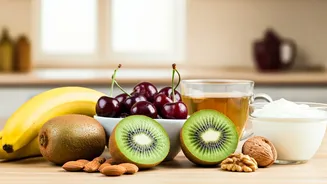Kiwi Powerhouse for Sleep
Kiwis are a nutritional treasure trove, and they're especially helpful when it comes to sleep. Studies show that consuming kiwi fruit before bed can significantly
improve sleep quality. This improvement may be due to the fruit's high serotonin content. Serotonin is a neurotransmitter that helps regulate sleep cycles. Furthermore, kiwis contain antioxidants and other beneficial compounds that can contribute to overall health. Including kiwi in your evening meal can lead to falling asleep more quickly, sleeping for a longer period, and experiencing fewer awakenings throughout the night. It is important to remember that everyone's body reacts differently. Therefore, it's advisable to experiment and observe how kiwi fruit affects your sleep patterns to determine the optimal timing and quantity for consumption to achieve the best results.
The Cherry's Melatonin Boost
Cherries, especially tart cherries, are a natural source of melatonin. Melatonin is a hormone that regulates the sleep-wake cycle. Consuming cherries or cherry juice can help increase melatonin levels, signaling the body that it's time to sleep. Research indicates that drinking tart cherry juice before bedtime can lead to improved sleep duration and quality. This is particularly beneficial for those experiencing sleep disturbances. The natural melatonin content in cherries provides a gentle and effective way to promote better sleep without relying on synthetic supplements. For the best results, it's recommended to consume cherry juice or fresh cherries an hour or two before going to bed. Keep in mind that individual responses may vary, and consistency is crucial. Regular consumption of cherries can lead to noticeable improvements in sleep patterns over time.
Nuts and Seeds for Calm
Nuts and seeds are excellent sources of magnesium and tryptophan, both of which are crucial for sleep. Magnesium helps to regulate the nervous system and can reduce stress and anxiety, promoting relaxation. Tryptophan is an amino acid that the body uses to produce serotonin and melatonin. Including a handful of almonds, walnuts, or pumpkin seeds in your evening snack can contribute to better sleep. These foods also provide healthy fats and proteins, which can help keep you feeling full throughout the night. Opting for unsalted varieties is best to avoid any potential impact on sleep from excess sodium. Consider adding a mix of seeds and nuts to your nighttime routine to maximize the benefits. Consistently incorporating these foods can support a more balanced and restful night.
Warm Milk and Sleep
The age-old remedy of warm milk before bed is more than just a comforting tradition; it has scientific backing. Milk contains tryptophan, which, as mentioned earlier, is a precursor to serotonin and melatonin. The warmth of the milk can also have a soothing effect, promoting relaxation. A glass of warm milk can help you fall asleep more quickly and experience fewer nighttime awakenings. For those who are lactose intolerant or prefer alternatives, other types of milk, such as almond or soy milk, can also be beneficial as long as they are fortified with tryptophan. The combination of the tryptophan and the calming effect of the warm beverage makes milk an accessible and effective bedtime aid. It is best consumed about an hour before going to bed to allow the body to process it and prepare for sleep.
Fatty Fish and Vitamin D
Fatty fish, such as salmon, are rich in vitamin D and omega-3 fatty acids, which can improve sleep quality. Vitamin D plays a significant role in regulating sleep cycles, and its deficiency is linked to sleep disorders. Omega-3 fatty acids, particularly DHA, have been shown to increase serotonin levels and reduce anxiety, promoting relaxation. Regularly consuming fatty fish can lead to better sleep duration and fewer sleep disturbances. Incorporating fish into your diet two to three times per week can contribute to improved sleep patterns. Consider grilling, baking, or steaming the fish to maintain its nutritional value and avoid added unhealthy fats. The combination of vitamin D and omega-3s makes fatty fish a great choice for both overall health and improved sleep quality.
Chamomile Tea's Calm Brew
Chamomile tea is well-known for its calming properties, primarily due to the antioxidant apigenin. Apigenin binds to specific receptors in the brain that may decrease anxiety and initiate sleepiness. Drinking chamomile tea before bed can help reduce stress and improve sleep quality. Its gentle effects make it a safe and effective option for those looking to improve their sleep without strong medications. The ritual of preparing and enjoying a warm cup of tea can also contribute to relaxation. Brew a cup of chamomile tea about an hour before bedtime to allow its effects to take hold. You can also combine it with other sleep-promoting foods, such as a handful of nuts or seeds. Consistently incorporating chamomile tea into your evening routine can lead to more restful nights and enhanced overall well-being.
Whole Grains for Bedtime
Whole grains, such as oatmeal and whole-wheat bread, can promote sleep due to their high magnesium content. Magnesium helps to relax muscles and calm the nervous system, making it easier to fall asleep. Additionally, whole grains can influence insulin levels, potentially helping to regulate sleep. Consuming a small portion of whole grains before bed can help stabilize blood sugar levels throughout the night, which can prevent sleep disruptions. Oatmeal, in particular, is an easy-to-prepare and comforting option for a bedtime snack. Top it with some berries or a sprinkle of nuts for added benefits. It is important to balance whole grains with other sleep-promoting foods to maximize the benefits. Including whole grains in your regular diet can contribute to long-term improvements in sleep quality and overall health.














